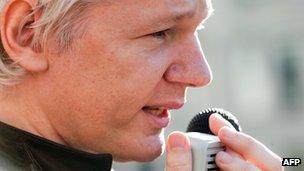Struggling Wikileaks stops publishing classified files
- Published

Julian Assange says a blockade by US finance companies has cut off 95% of Wikileaks' revenue
The whistle-blowing website Wikileaks is suspending its publication of classified files.
Wikileaks said that it would focus instead on raising funds to ensure its future survival.
The announcement came after what the group called a blockade by US-based finance companies.
This followed its disclosure on the internet of hundreds of thousands of secret US government files and diplomatic cables.
Wikileaks founder Julian Assange said that since last December an "arbitrary and unlawful financial blockade" had been imposed by Bank of America, Visa, MasterCard, PayPal and Western Union.
"The attack has destroyed 95% of our revenue," he said.
The former computer hacker said the organisation had lost "tens of millions of dollars in lost donations at a time of unprecedented operational costs".
"A handful of US finance companies cannot be allowed to decide how the whole world votes with its pocket," he added.
Mr Assange said Wikileaks must "aggressively fundraise in order to fight back against this blockade and its proponents".
He said the group was taking pre-litigation action against the blockade in Iceland, Denmark, the UK, Brussels, the United States and Australia and had lodged an anti-trust complaint at the European Commission.
A Wikileaks spokesman, Kristinn Hrafnsson said its website would reopen for submissions of confidential documents on 28 November.
Norfolk farmhouse
Mr Assange is in Britain awaiting a decision by the High Court on the appeal against his extradition to Sweden to face sex assault allegations.
After the hearing in July, judges did not give a date for their decision on Mr Assange's bid to overturn a judgment made in February.
He fears extradition to Sweden may lead to him being sent to the United States to face separate charges relating to Wikileaks, for which he could face the death penalty.
The Australian won bail in December and has been staying at Ellingham Hall, a 10-bedroom Norfolk farmhouse owned by Vaughan Smith, director of the Frontline media club.
His bail conditions include wearing an electronic tag and daily appearances at a nearby police station.
Mr Assange describes the allegations as "without basis".
Bank of America and Mastercard have refused to comment to the BBC.
PayPal referred the BBC to a statement issued last December which said that Wikileaks had violated its "Acceptable Use Policy", specifically alleging that WikiLeaks was encouraging sources to release classified material, which was likely to be a violation of US law.
Visa Europe also said that merchants wanting to accept Visa payment must abide by its operating regulations and also the applicable laws in the country or countries where the cardholder and the merchant were based.
- Published28 September 2011
- Published17 September 2011
- Published7 December 2010
- Published2 September 2011
- Published27 July 2011
- Published13 July 2011